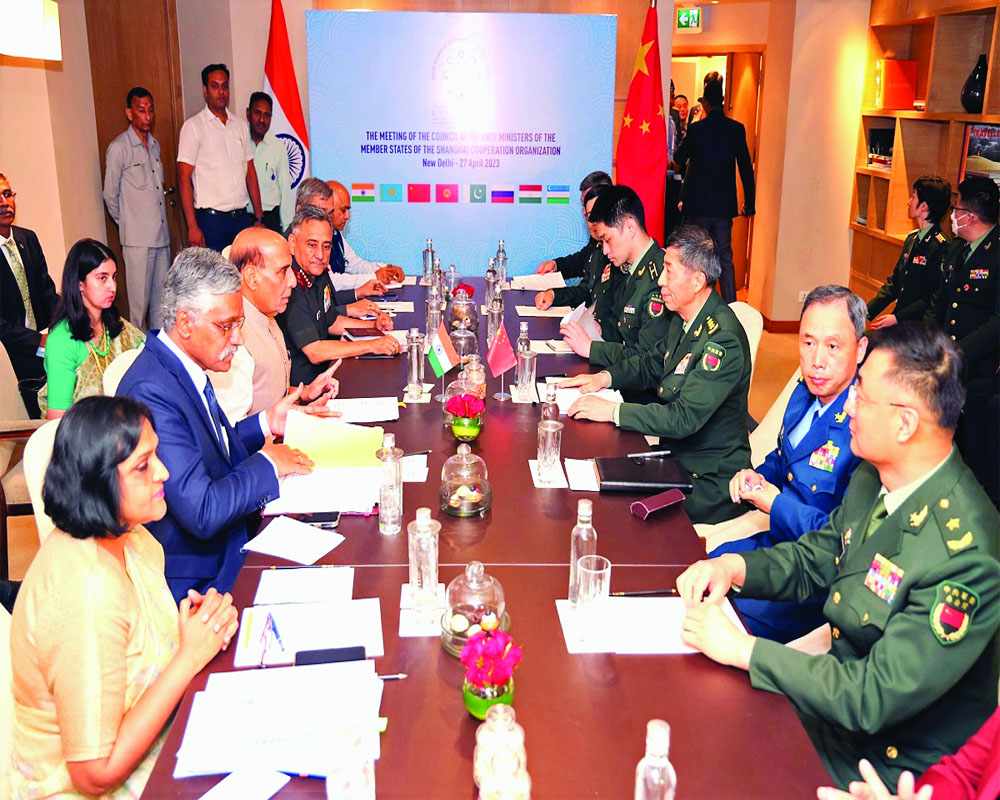To be effective, Shanghai Cooperation Organisation needs to come out of Chinese influence and push its own cherished goals, writes Sumit Jha
‘The meeting of the foreign ministers of the Shanghai Cooperation Organisation (SCO) in the Indian city of Goa took place on 4-5 May to review the progress of the grouping. In doing so, Indian External Affairs Minister S. Jaishankar proposed the New Delhi declaration and four joint statements on cooperation on de-radicalisation strategies, promotion of millets and sustainable lifestyles to address climate change and digital transformation.
True, since its creation in 2001, SCO has expanded its size by inducting more countries as members and observers. Efforts have also been taken to institutionalize the grouping. In turn, SCO has become the largest organisation in terms of geographic scope and population, covering approximately 60% of the area of Eurasia, 40% of the world population. Moreover, with the presence of three major world powers – China, Russia, and India – as well as some oil and gas rich countries – Turkmenistan, Kazakhstan, and Kyrgyzstan, the eight-member organisation is seen to play a crucial role in shaping the nature of regional and global politics.
However, even a cursory glance at the functioning of SCO revels some fundamental limitations facing the organisation. One such structural problem is China’s intent to dominate SCO. After all, the creation of SCO lies in China’s desire to improve ties with Asia to achieve its interests in the post-cold war era. Thus, the Shanghai Five (China, Kazakhstan, Kyrgyzstan, Russia, Tajikistan) was formed in 1996 to enable China to resolve border problems with its Central Asian neighbours, Beijing’s political, security and economic interests led to the creation of SCO. More to the point, China’s foreign policy objectives have had a profound impact on the philosophy and objectives of SCO.
For example, while the idea of promoting cooperation among member countries to fight against the evils of terrorism, separatism, and extremism is a major objective of SCO, China is interested only in protecting itself from the menace of terrorism. More to the point, since there is an increasing concern in the Chinese strategic community that a close historic, ethnic, cultural, linguistic, and religious proximity between a majority of people in the Xinjiang and Uighurs residing in neighbouring Central Asian countries can pose a serious security threat to China, Beijing has taken initiatives to prevent the influence of foreign terrorism and separatists in Xinjiang.
Furthermore, with the return of the Taliban, the Xi Jinping regime has become more anxious about security situations in the Xinjiang province, given the nexus between Uighur separatists and the Taliban terrorist organisation. Consequently, China lost no time in recognising the Taliban regime in Afghanistan and Beijing is also contemplating the possibility of including Kabul as a member of SCO.
On the other hand, China has remained hostile to SCO taking tough efforts to eradicate terrorism. This is evident from the fact that China has openly supported Pakistan and other countries which are protector of terrorist organisations. Moreover, China has consistently thwarted global efforts to deal with the menace of terrorism.
China has also brazenly violated the SCO charter that talks about respecting sovereignty, territorial integrity of member states, non-use of force or threat of its use in international relations and seeking no unilateral military superiority in adjacent areas. One example in this regard is its efforts to undermine India’s sovereignty over the Indian state of Jammu and Kashmir through the China-Pakistan Economic Corridor. But China’s bullying behaviour is not limited to only SCO member countries.
Another limitation facing SCO is the uneven economic benefits that China has succeeded in garnering from other member countries. More to the point, China enjoys surplus trade with all member countries of SCO. China’s imports and exports with other member countries of the Shanghai Cooperation Organization (SCO) touched a new high of $250 billion in 2021-2022. This trend confirms the imperialistic tendency of China.
China’s assertive posturing contradicts SCO aims to move towards developing a democratic and equitable international political order. In fact, one issue on which Beijing can easily be cornered is the lake of democratic space in China and the Chinese Communist regime’s attempt to undermine the liberal- democratic international order.
Of course, other member countries of SCO are fully aware of China’s clandestine purpose. India has in fact questioned China’s move to undermine SCO’s fundamental principles. But New Delhi finds itself alone on this matter in the groping. The dependence of Russia on China due to the Russian invasion of Ukraine has further strengthened China’s position in the SCO.
Hence, amid high expectations from this region grouping towards promoting peace, security, and development in Eurasia and beyond, the immediate challenge facing SCO is to free itself from China’s clutches. Only time will tell if it will happen or not.
(The writer is Assistant professor, Dept of Political Science, DU)


























